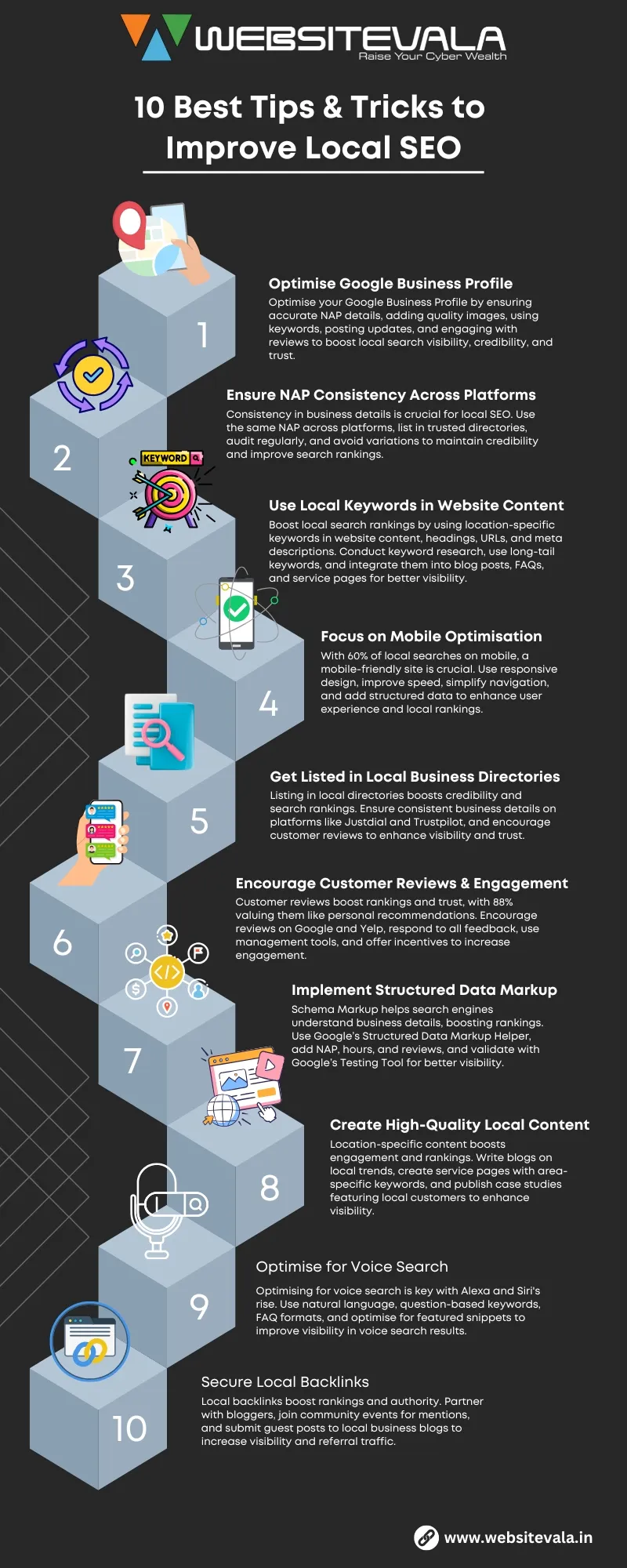Jump Directly to the Topic of Your Interest
Toggle- What is Local SEO?
- Why is Local SEO Important?
- How Does Local SEO Work?
- Top 10 Tips to Improve Local SEO
- 1. Optimise Google Business Profile (GBP)
- 2. Ensure NAP Consistency Across Platforms
- 3. Use Local Keywords in Website Content
- 4. Get Listed in Local Business Directories
- 5. Focus on Mobile Optimisation
- 6. Encourage Customer Reviews & Engagement
- 7. Implement Structured Data Markup (Schema Markup)
- 8. Create High-Quality Local Content
- 9. Optimise for Voice Search
- 10. Secure Local Backlinks
- Conclusion
Today’s highly competitive digital landscape demands that businesses utilise local SEO to optimise their online presence and draw customers in effectively. Local SEO plays a pivotal role here – regardless of whether the business operates as a retail store, restaurant, or service provider, improving visibility on search engines can lead to significant growth and increased customer acquisition.
Research by Google shows that 76% of people who search for something nearby on their smartphone visit related businesses within 24 hours; 28% even lead directly to purchases. This illustrates its immense potential as a growth driver for any enterprise.
What is Local SEO?
Local SEO (Search Engine Optimization) is about improving a business’s online presence. This helps it appear in local search results. It targets customers looking for products or services nearby. For example, people might search for “best coffee shop near me” or “dentist in London.”
This process allows businesses to target local customers who are searching for products or services, such as the latter searches with keywords like “best coffee shop near me” or “dentist in London.”
BrightLocal (2023) conducted research that showed 98% of consumers use the internet to gather information about local businesses, while 87% read online reviews before making their choice. Businesses can gain an edge by employing effective local SEO strategies to appear when potential customers search online for similar services.
Why is Local SEO Important?
Local SEO should be considered essential for businesses looking to expand visibility, attract nearby customers, and increase sales. Here’s why investing in it could make a difference:
1. Higher Rankings Lead to More Customers
Customers searching online for local businesses often select those at the top of Google’s local search pack, increasing your chance of attracting new visitors and conversions. Without proper local SEO practices in place, businesses risk losing customers to competitors that rank higher.
2. Increase Foot Traffic and Sales
Most consumers use search engines to quickly locate services or stores nearby, so optimising for local searches allows businesses to capture users who are actively looking for solutions, leading them to visit more stores or purchase directly. Mobile searches with local intent have proliferated exponentially, making mobile-friendly SEO strategies even more essential than ever before.
3. Building Trust and Credibility
A well-optimised Google Business Profile, coupled with positive customer reviews, can strengthen a brand’s online visibility and credibility. Consumers tend to trust businesses with increased online exposure and favourable ratings more readily; encouraging and managing online reviews plays a vital role in earning customer trust while outstripping competitors.
How Does Local SEO Work?
Local SEO helps businesses appear in search results when customers conduct localised searches for products and services. Search engines rank businesses based on factors like relevance, distance, prominence, and consistency with online directories such as Name Address and Phone number information; any inconsistencies could potentially hinder search engines from assessing the legitimacy of businesses in local search results.
Google’s Local Pack, which displays top-ranking businesses, relies on indicators like business profile completeness, customer reviews, and engagement levels as criteria for selection. Accurate details across platforms enhance credibility, while locally relevant content increases search visibility; businesses that actively manage their online presence by keeping information current and responding to customer feedback may see higher rankings than their counterparts.
Search engines also consider backlinks from local sources when assessing a business’s authority within its region. Brand mentions on reliable websites help build trust and improve ranking potential; by prioritising NAP consistency, local backlinks, and user engagement factors, businesses can boost their online presence and attract more local customers.
Utilising Local SEO tactics, businesses can increase online visibility, attract new customers, and drive conversions. Below are 10 actionable steps that will further bolster Local SEO efforts.
Top 10 Tips to Improve Local SEO
1. Optimise Google Business Profile (GBP)
A well-optimised Google Business Profile (GBP) ensures better visibility in local searches and Google Maps. GBP is one of the most critical elements in local SEO services because it helps customers find accurate business information instantly. To optimise it:
- Ensure that all business details, including Name, Address, Phone Number (NAP), website URL, and working hours, are accurate and up-to-date.
- Add high-quality images showcasing the business location, products, or services to build credibility.
- Use keywords like “best local SEO services” in the business description to improve visibility in local searches.
- Regularly post updates about offers, services, and business activities to engage potential customers.
- Respond to customer reviews promptly, as engagement increases trust and search rankings.
2. Ensure NAP Consistency Across Platforms
One of the biggest mistakes in local SEO for small businesses is inconsistent business details across various platforms. Search engines rely on accurate business information to establish credibility. To ensure consistency:
- Use the exact same business name, address, and phone number (NAP) across Google Business Profile, social media, and local directories.
- Get listed in authoritative business directories like Yelp, Yellow Pages, and TripAdvisor.
- Audit listings frequently and update outdated or incorrect information.
- Avoid unnecessary abbreviations or alternate spellings that may cause discrepancies.
3. Use Local Keywords in Website Content
To rank higher in local searches, businesses must integrate local keywords strategically into their website content. Using the right keywords improves search relevance and increases visibility. Here’s how to do it effectively:
- Conduct keyword research using tools like Google Keyword Planner, Ahrefs, or Ubersuggest to find location-specific keywords.
- Use keywords naturally in website copy, headings, URLs, and meta descriptions.
- Incorporate long-tail local keywords like “best local SEO services in India” for better targeting.
- Add local keywords in blog posts, FAQs, and service pages to enhance search rankings.
4. Get Listed in Local Business Directories
Local business directories help establish credibility and improve local search rankings. Being listed in multiple directories increases the chances of appearing in search results. To maximise the impact:
- List the business on popular local directories like Justdial, IndiaMART, Sulekha, and Trustpilot.
- Ensure that the business information is consistent across all directories.
- Encourage customers to leave reviews on these directories, as positive ratings improve credibility.
5. Focus on Mobile Optimisation
Since 60% of local searches come from mobile devices, having a mobile-friendly website is essential for better local rankings. To optimise a website for mobile:
- Implement a responsive web design so the site adapts to different screen sizes.
- Improve page speed using tools like Google PageSpeed Insights.
- Ensure easy navigation, large buttons, and simple forms for better user experience.
- Use structured data markup to make business information easily accessible on mobile searches.
6. Encourage Customer Reviews & Engagement
Customer reviews heavily influence search rankings and customer trust. 88% of consumers trust online reviews as much as personal recommendations. To leverage reviews:
- Request happy customers to leave reviews on Google, Yelp, and Facebook.
- Respond to all reviews, both positive and negative, to build trust and engagement.
- Use review management tools like Trustpilot to track and manage feedback.
- Offer incentives like discounts or loyalty points for customers who leave reviews.
7. Implement Structured Data Markup (Schema Markup)
Schema Markup provides search engines with more information about the business. Implementing LocalBusiness schema markup can improve rankings. Steps to apply schema markup:
- Use Google’s Structured Data Markup Helper to generate schema code.
- Add structured data for NAP details, opening hours, reviews, and business type.
- Validate schema using Google’s Structured Data Testing Tool.
8. Create High-Quality Local Content
Creating location-specific content improves engagement and search engine rankings. Some content ideas include:
- Writing blog posts about local industry trends, community events, and news.
- Creating local service pages with city or area-specific keywords.
- Publishing case studies and success stories about local customers.
9. Optimise for Voice Search
With the rise of voice assistants like Alexa, Google Assistant, and Siri, optimising voice search is crucial. To do this:
- Use natural language and question-based keywords in content (e.g., “Where can I find the best bakery in London?”).
- Structure content in an FAQ format to target voice search queries.
- Optimise for featured snippets, as voice search often uses them for answers.
10. Secure Local Backlinks
Backlinks from local sources help improve search rankings and build domain authority. To earn quality local backlinks:
- Partner with local bloggers, influencers, and news websites.
- Get involved in community events and sponsorships to earn mentions.
- Submit guest posts to local business blogs to gain referral traffic.
Conclusion
Investment in local SEO is no longer optional for businesses wishing to thrive in an increasingly digital-first world. Google Search and Maps serve as primary tools for local searches, with over half of consumers turning to them when seeking local business information, according to SOCI. Moreover, four out of five consumers use search engines like Google to gain this data about local businesses.
As consumer behaviour increasingly favours instant, location-based searches, businesses that fail to optimise for local SEO risk being overshadowed by competitors who rank higher in search results. Voice search, mobile usage, and personalised experiences only reinforce the need to keep up with evolving SEO trends.
By consistently refining their local SEO strategies, providing accurate business information, and creating engaging content and reviews to draw in visitors and build customer engagement, businesses can establish themselves as industry authorities in their niche industries.
With search engines shifting towards prioritising user intent and localised results, businesses that invest in effective local SEO practices will best position themselves to experience increased visibility, greater foot traffic growth, and long-term success within their target markets.
For expert local SEO services, contact us today!

MohammedTahir Patel is a Website Developer and Digital Marketing Consultant with 8+ years of experience in SEO, Local SEO, and online growth strategies. He specializes in building SEO-friendly WordPress websites, managing digital marketing campaigns, and helping small businesses grow their online presence. Passionate about technology and automation, MohammedTahir combines creativity with technical expertise to deliver results that matter.




